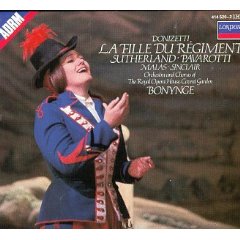Gaetano Donizetti – La Fille Du Regiment (Bonynge) [2009]
Gaetano Donizetti – La Fille Du Regiment (Bonynge) [2009]

Overture Act 1 "L'ennemi s'avance, amis, armons-nous!" "Pour une femme de mon nom, quel temps, hélas, le temps de guerre!" "Sacré nom d'une pipe!" "Au bruit de la guerre" "Allons, allons, march', march' à l'instant" La la la ...chacum le sait, chacun le dit Dès que l'appel sonne Ils l'ont emmené brutalement "Quoi! vous m'aimez?" Rataplan, rataplan, rataplan "Ah! mes amis, quel jour de fête!" Le camarade est amoureux! Je suis soldat Act 2 Entr'acte ... Enfin la voilà La romance perdue, on la retrouvée "Le jour naissait dans le bocage..." "C'en est donc fait, en mon sort va changer" "Tous les trois réunis, quel plaisir mes amis!" Ecoutez-moi, de grâce "Ah!, c'est elle!" "Oui! Quand le destin, au milieu de la guerre, enfant, me jeta dans leurs bras" Dame Joan Sutherland (Soprano), Monica Sinclair (Alto), Luciano Pavarotti (Tenor), Spiro Malas (Bass), Edith Coates (Mezzo Soprano), Dominic Cossa (Baritone), Jules Bruyère (), Allan Jones (Tenor) Orchestra & Chorus Of The Royal Opera House Covent Garden Richard Bonynge - conductor
The classic recording is now available at mid-price for the first time. Recorded in 1967, the recording features Joan Sutherland and Luciano Pavarotti at the high-noon of their careers! Pavarotti, with great charm and humor, tosses off endless high notes in a barnstorming performance. Sutherland easily tackles the great vocal demands and gives an effortlessly stunning performance. No other recording of this opera has come close to surpassing this classic for vocal beauty and sheer thrills! ---amazon.com
Even Dame Joan Sutherland has rarely if ever made an opera recording so totally enjoyable and involving as this. With the same cast (including chorus and orchestra) as at Convent Garden, it was recorded in 1968 immediately after a series of live performances in the Royal Opera House, and both the comedy and the pathos come over with an intensity born of communication with live audiences. That impression is now the more vivid on this superb CD transfer, for with spoken dialogue used in this original French version of the opera the absence of background noise is a special benefit, and the production vividly captures the developments in the story.
Where on LP the first of the two acts spread on to the second record, here the two acts are each contained complete on one disc, an obvious convenience, though the booklet gets the timings reversed for each, the First Act being much the longer. As usual with Decca opera sets on CD, I could do with more bands to separate items and it strikes me as odd not to indicate separately the most spectacular of Luciano Pavarotti's contributions, his brief but important solo in the finale to Act 1, which—so far as I remember—was the specific piece which prompted the much-advertised boast ''King of the High C's''. For those who want to find it, it comes at 2'58'' in band 13 of the first disc, but you should have been able to find it at the touch of a button.
Dazzling as the young Pavarotti's singing is, it is Dame Joan's performance which, above all, gives glamour to the set, for here in the tomboy, Marie, she found a character through whom she could at once display her vocal brilliance, her ability to convey pathos and equally her sense of fun. The reunion of Marie with the men of her regiment and later with Tonio makes one of the most heartwarming operatic scenes I know at once a moment for laughing and crying, magically captured here. The digital transfer reinforces the quality of the Decca engineering at this point and throughout, so much more specific with sound set within a believable acoustic, than with many recent recordings.' ---Edward Greenfield, GRAMOPHONE (11/1968)
download: uploaded anonfiles yandex 4shared solidfiles mediafire mega filecloudio
Last Updated (Thursday, 31 October 2013 23:55)








